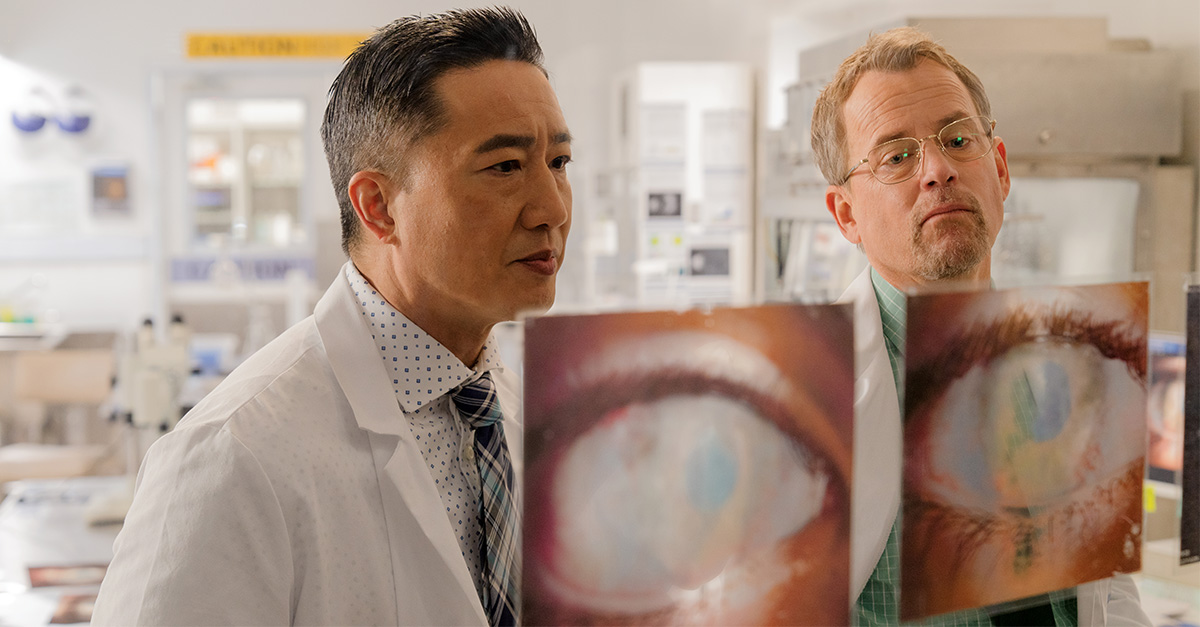


Get a free copy of Parental Rights & Education when you subscribe to our newsletter!

Though not overtly Christian, “Sight” is the true story of a Christ-filled doctor overcoming a horrific past and doing his part to help others with grace, humility, forgiveness, and inspiration.
If you’re like me, you rarely visit the movie theater anymore. The price of drinks and snacks alone can make your jaw hit the floor and send you running back to your free television.
I stopped going to the movie theater because the movies being released, like the studios that make them, are devoid of morality. Instead they force feed left-leaning ideologies, or the storylines revolve around sex and nudity, gratuitous violence, and absurdly obscene language.
Yesterday, though, I decided I would pay my local movie theater a visit (taking my mom along) to watch a different caliber of movie: “Sight.”
And I am so very happy that I did.
“Sight” tells the story of Dr. Ming Wang, who grew up during the Cultural Revolution in China. Wang later became a world-renowned eye surgeon who helped develop technologies that have helped millions regain their sight. Additionally, he founded the Wang Foundation for Sight Restoration, which has helped patients from 40 states and 55 countries see again — at no charge.
“Sight” was produced by Angel Studios, the same studio that produced last year’s hit “Sound of Freedom.” The quality of this latest film did not disappoint.
Wang as an adult is played by Terry Chen, who expertly embodies the story of a man desperate to help others while wrestling with the past he can’t forget.
As Wang tries to help a little girl, Kajal, from Calcutta, India, who was blinded with acid by her stepmother, he is driven by the memories and images of a dear childhood friend who he was unable to protect from the revolutionaries.
“Sight” is the retelling of how Kajal helped Wang deal with his past and in the process, gain sight into what lies beyond what one can physically see with their eyes.
The story is told by alternating between the present (2007), and flashbacks. I found it a moving and effective way to help you better understand Wang, the person.
One could hardly blame you if after seeing “Sight” you wondered, “Is this all true?”
At the end of the movie, a video of Dr. Wang is shown in which he assures viewers the events of the movie are accurate. And Chen says that Dr. Wang really is the way he is portrayed.
During shooting for the movie, Wang was available to any of the cast and crew who had questions or medical issues.
Chen stated, “He set up a table to do his medical work and helped anyone with questions about their own or their family’s struggles with sight. His altruism, his faith, his tenacity are all true. This is a man who has such an open, generous heart, who shares his faith, who shares his ideologies in such a way where it’s such an honor and a privilege to even be beside him right now and to portray this man.”
As we left the theater my mom said, “That wasn’t an overtly Christian movie, but that is the type of movie that I want to come see.”
And that’s true: “Sight” isn’t overtly Christian, so for those expecting a clear presentation of the Gospel or a portrayal of someone converting to Christianity, that’s not really what the movie does. Prayer is mentioned, a bracelet with a cross is given to Wang by Kajal, and at the end the real Wang does speak about God, but this isn’t a movie designed to be in-your-face about Christianity.
“Sight” is actually in the same vein of other Christian biopics that inspire us to use the talents we’re given and the struggles we face to grow in our faith so we can help others and advance God’s kingdom.
One of the film’s greatest strengths is its subtlety.
The makers of “Sight” chose to show you a sample of the ideology and the effects of the Cultural Revolution organically, not give you a lecture.
They showed some violence by the radicals, but it was measured, some of it implied, rather than gory.
They chose to create scenes of eye surgeries without showing every gruesome detail.
They portrayed the ethics of hard work, love, sacrifice, God’s providence, and seeing beyond ourselves without making a “Christian movie.”
“Sight” is exactly the type of movie I want to see in theaters, and I strongly recommend you go see it this weekend or very soon.
If movie theater prices are too steep for your budget, Angel Studios distributes free tickets. Those who want to help pay for others to see “Sight” can do so through Angel Studio’s pay-it-forward option.
If you want to learn more about Dr. Wang and his journey, you can order his autobiography called “From Darkness to Sight” from his foundation or from Amazon. All proceeds from the book go to the foundation so Dr. Wang can restore the sight of others.
If you like this article and other content that helps you apply a biblical worldview to today’s politics and culture, consider making a donation here.
Notifications